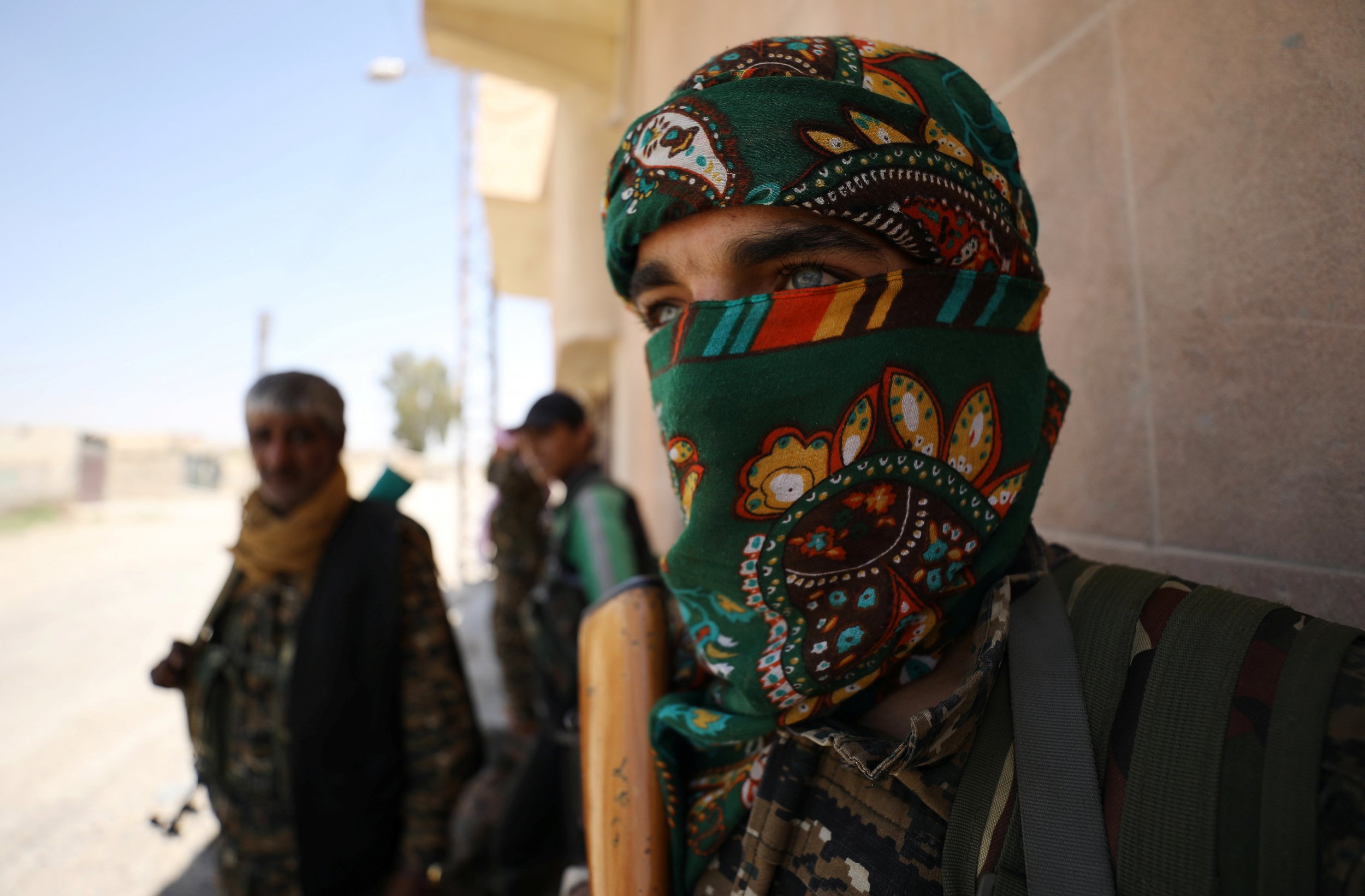
The Russia-backed Syrian military made a lightning advance Tuesday into the Islamic State militant group (ISIS) stronghold of Raqqa, opening a new front against the jihadis as they face a separate assault from local forces supported by the U.S.
The advancing Syrian army and its allies, which include Iran and various militias supportive of President Bashar al-Assad, met the defense lines of the Syrian Democratic Forces, a U.S.-backed, majority-Kurd coalition of Arabs and ethnic minorities. The two groups, both of which are heavily involved in the fight against ISIS, have clashed and allied at various time in the past. But current U.S. tensions with Assad allies Russia and Iran have raised concerns that a competition to overtake Raqqa could spark a new conflict between the oncoming forces.
Related: Russia warns U.S. against attacking Syrian army as allies beat ISIS at border
Local media shared footage of the Syrian army and allied forces as they pushed ISIS back from several villages in western Raqqa and the Resafa juncture, a strategic crossroads between the historic town of Resafa and the Syrian Democratic Forces-held Tabqa air base, pro-government outlet Al-Masdar reported.
Further gains, reportedly spearheaded by the Syrian army's elite Tiger Forces, included closing in Wednesday on large oil fields near Thawra and Sfayeh that helped fund ISIS's global militant network. The military has also severed the final ISIS support routes to Aleppo, which was retaken from insurgents late last year in what was widely considered to be a major turning point in the six-year-long war.
First combat footage of #SAA operations against #ISIS at the edges of Al-Raqqa province.#الرقة pic.twitter.com/jAirPsGMn6
— Majd Fahd 🇸🇾 (@Syria_Protector) June 13, 2017
Meanwhile, the Syrian Democratic Forces pierced deeper Tuesday into the ISIS heartland of the Raqqa governorate on at least two fronts. The latest offensive is part of a massive campaign launched in November and intended to first isolate the ISIS-held city before ultimately dislodging the militants entirely. As shells rained down on ISIS positions, the Syrian Democratic Forces reportedly took several more neighborhoods on the city's east side. Artillery fire caused heavy ISIS casualties Monday as Syrian Democratic Forces took control of Raqqa University's science school.
"The building had been used by ISIS as a security center. The Syrian Democratic Forces soldiers were able to expel ISIS militants from the building and seized a large deal of ammunition there," Syrian Democratic Forces officer Habun Osman told Syrian Kurdish news outlet ARA News Monday.
"The progress came after heavy clashes with ISIS terrorists," he added, noting that dozens of ISIS militants had been killed in combat.
The U.S.-backed irregular forces have seen swift wins early on in the final phase of the battle to defeat ISIS in Raqqa, but the U.S. military has described the days ahead as "long and difficult," according to The Washington Post. The Syrian Democratic Forces have recently reached the eighth-century walls that fortify the Old City, and the forces anticipate fierce resistance as they move forward.

The territorial gains mean pro-government forces and the Syrian Democratic Forces now share a line of defense across northern Syria that extends nearly 70 miles long from the region south of Manbij, where the two factions formed a tentative truce earlier this year in defense against Turkish-backed rebels, to territory newly won by the Syrian army south of Tabqa. While unverified reports of minor clashes between the Syrian army and the Syrian Democratic Forces have emerged from southern Tabqa, the two forces appear to be focusing their efforts against the mutual threat of ISIS. Both sides oppose the jihadis' ultraconservative brand of Sunni Islam but disagree over the level of autonomy Kurds should enjoy in northern Syria, where Kurdish nationalist factions of the Syrian Democratic Forces seek independence from the Syrian government.
The relationship between Russia and the U.S. has dramatically deteriorated in recent months. President Donald Trump, who once considered allying with Russia to battle ISIS in Syria, changed course after his administration was hit with a series of accusations concerning illegal, undisclosed collaboration with Moscow. In April, the U.S. accused Assad of conducting a chemical weapons attack on civilians in the northwestern governorate of Idlib, which is under rebel control. Although the Russian and Syrian governments challenged the veracity of these claims, Trump attacked the Syrian military for the first time days later, targeting an air base.
#South #Tabqah :#SAA take Jubb Ghānim, Jubb Abū Şūşā, Jubb ‘Abd al ‘Azīz, Bir Inbaj, Rajm Askar + Sfaiyeh oil field from #Daesh v @watanisy pic.twitter.com/9h02ibkS5W
— Emmanuel (@EmmanuelGMay) June 13, 2017
Since then, the U.S. has attacked pro-government forces three times, accusing them of breaching a "deconfliction zone" unilaterally declared by the U.S. in southern Syria. The U.S.'s "deconfliction zone," near the region of Al-Tanf and located by the Jordanian and Iraqi borders, has been viewed as illegitimate by Moscow and Damascus, in part because it was not included in a deal made last month by Russia, Iran and Turkey that created four "de-escalation zones" restricted from foreign military use elsewhere in Syria.
A Syrian field commander called the U.S.'s self-proclaimed zone "ridiculous" on Tuesday, according to the state-run Syrian Arab News Agency. The Syrian government considers U.S. military presence in Syria illegal.
On Monday, Russian Foreign Minister Sergey Lavrov demanded in a phone call with Secretary of State Rex Tillerson that the U.S. cease attacks on the Syrian military and its allies.
Uncommon Knowledge
Newsweek is committed to challenging conventional wisdom and finding connections in the search for common ground.
Newsweek is committed to challenging conventional wisdom and finding connections in the search for common ground.
About the writer
Based in his hometown of Staten Island, New York City, Tom O'Connor is an award-winning Senior Writer of Foreign Policy ... Read more





